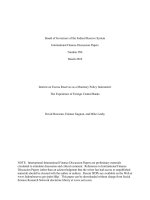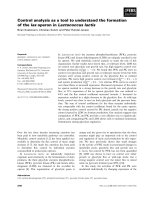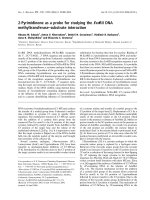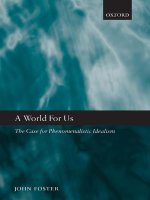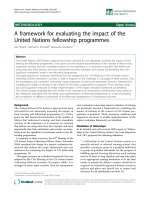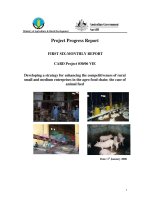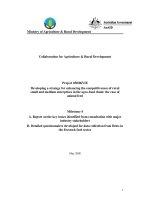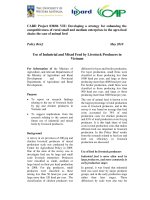Family culture as a value for constructing the oriental identity (the case of tieng dan newspaper (1927-1943) by Huynh Thuc Khang)
Bạn đang xem bản rút gọn của tài liệu. Xem và tải ngay bản đầy đủ của tài liệu tại đây (320.53 KB, 8 trang )
TRƯỜNG ĐẠI HỌC SƯ PHẠM TP HỒ CHÍ MINH
TẠP CHÍ KHOA HỌC
HO CHI MINH CITY UNIVERSITY OF EDUCATION
JOURNAL OF SCIENCE
KHOA HỌC XÃ HỘI VÀ NHÂN VĂN
SOCIAL SCIENCES AND HUMANITIES
ISSN:
1859-3100 Tập 16, Số 7 (2019): 45-52
Vol. 16, No. 7 (2019): 45-52
Email: ; Website:
Research Article
FAMILY CULTURE AS A VALUE FOR CONSTRUCTING
THE ORIENTAL IDENTITY *
(THE CASE OF TIENG DAN NEWSPAPER (1927-1943)
BY HUYNH THUC KHANG)
Ngo Thi Thanh Tam*, Le Thu Yen
*
Corresponding author: Ngo Thi Thanh Tam – Email:
Received: March 18, 2019; Revised: May 02, 2019; Accepted: June 17, 2019
ABSTRACT
The process of acculturation with Western cultures might have an impact on Vietnamese
intellectuals from the early twentieth century, which enabled them to make wise choices so that
they, once again, reaffirmed their beliefs on their national values. Moving in completely the same
circle with Oriental cultures, Vietnam undoubtedly shared with them a myriad of common customs
and beliefs, in particular family values originally based on Confucianism. Additionally, many
activists in Vietnam, somehow, in the interaction with Western cultures, decided to preserve and
promote the family values, which are considered as the foundation in constructing Vietnamese
identity in comparison with Oriental norms and values. ‘Tieng Dan’ newspaper, whose editor was
Huynh Thuc Khang, is a typical example for that trend.
Keywords: cultural identity, Orient, Huynh Thuc Khang, family culture.
1.
Introduction
From the end of the nineteenth century to the first decade of the twentieth century,
the Vietnamese systemic culture patterns were confronted with considerable changes due
to the impact of acculturation from Western culture and civilization. The more the
indigenous culture acculturates to other cultures, the more it become highly self-conscious
about its identity. “Identifying identity means comprehending: how we see ourselves and
how others see us?” (Chris Barker, 2011, p.298). Stuart Hall (1987) stated that identity
was continuously “hit” and challenged by cultural interactions and it caused unstoppable
changes in the ways we were shown or solved the systemic cultures surrounding us. This is
a remarkable feature in the process of cultural exchange and acculturation. In relation to
the Western culture, Vietnam is in the Eastern Asian cultural trajectory. The Eastern Asia
concept, according to our approach, is understood as a cultural region with specific
Cite this article as: Ngo Thi Thanh Tam, & Le Thu Yen (2019). Family culture as a value for constructing
the oriental identity (the case of Tieng Dan newspaper (1927-1943) by Huynh Thuc Khang). Ho Chi Minh
City University of Education Journal of Science, 16(7), 45-52.
45
Tạp chí Khoa học Trường ĐHSP TPHCM
Tập 16, Số 7 (2019): 45-52
features, not just a geopolitical region. In Eastern Asia, “the acculturation from external
civilization always takes place within the framework of the preservation and honor of
indigenous values” (Ho Si Quy, 2006, p.171). In addition to the prevailing Western
civilized values, the family culture on the Confucian foundation has been chosen by many
intellectuals, including Huynh Thuc Khang to form Vietnamese identity in particular and
Eastern Asian identity in general.
Huynh Thuc Khang (1876-1947), one of the typical progressive activists in the early
twentieth century, would gain great advantages from his press forum. We would like to
mention the People’s Voice (1927-1943), the first national language newspaper in Central
Vietnam. Chairman and editor of the People’s Voice - Huynh Thuc Khang - wished to use
the newspaper as an educational tool to disseminate progressive ideas and let people be
aware that they are Vietnamese. In terms of cultural relations, the educational purpose of
the People’s Voice is considered as a sense of self-recognition, self-affirming Vietnamese
cultural identity in relation to other cultures; it the journey in which Huynh Thuc Khang
attempts to identify the “Oriental cultural truth” (ibid., p.589)1.
2.
Huynh Thuc Khang’s discussion about the matter of family culture in the
Confucian viewpoint
The concept of Family culture, in our approach, is a system of values and norms that
regulates the relationships in families, dominates the behaviors of family members and
distinguishes one family with another. Traditionally, Vietnamese attach great value to
families. Families are of more importance in cultures with Confucian traditions. Therefore,
when discussing family culture, Huynh Thuc Khang traced back to the difference between
the Orient and Occident.
2.1. Family culture in the the Oriental and Occidental difference
On many of the leading articles of the Tien Dan, Huynh Thuc Khang had in-depth
discussions about the relationship between the Orient and Occident on the ground of
national cultural development. From the Dong Kinh Nghia Thuc movement, the
modernists soon determined the distinction between the Orient and Occident, indicates the
original characteristic of our civilization as “being always static”, while European
civilization as “being always dynamic” (Chuong Thau, 1997, p.121). Sharing the same
point of view with Dong Kinh Nghia Thuc, Huynh Thuc Khang supposed that in the Orient
it is the precious order and discipline that makes it unique. We are strong on order, while
the West on evolution. “The term “old” is often used in the same sense with the word”
order”, the term “morden” with the word “progress” in philosophy” (ibid., p. 262). Many
people fear that “in a society, in order to have order, there must not be evolution; if there
1
The materials in Tieng Dan newspaper are taken from Huynh Thuc Khang's collection, collected and
compiled by Chuong Thau & Pham Ngo Minh (2010). In this article we only briefly note (ibid, page).
46
Tạp chí Khoa học Trường ĐHSP TPHCM
Ngo Thi Thanh Tam et al.
is evolution, order cannot exist” (ibid., p.262). However, Huynh Thuc Khang affirmed:
“Order and evolution must go together... so that a society is created” (ibid., p.262)
This means that he thinks a society can only evolve (dynamic) based on the
foundation of order (static). The relationship between the Orient - old - static and the
Occident - modern - dynamic was analyzed and traced to the source by Huynh Thuc
Khang. Asserting the difference in regional and national identity as Huynh Thuc Khang's
way of doing is not to proscribe the Occident. Scholar Huynh Thuc Khang has never
adopted a persistent attitude towards hostility to the Occident, or followed blindly. Huynh
Thuc Khang was aware of the national identity only when taking social progress as the
final option. Amartya Sen (2016) argues that the problem lies in the choice: “In each
social context, there are some potential identities that can become important and
significant, which can be evaluated based on their acceptable ability and relative
importance” (p.73). The “static” value, or the stability of order and discipline of the
Eastern Asian civilization discussed by Huynh Thuc Khang “was establish in a way that
reconciles with the current scholars world and prepares for the “national back-and-forth
movement in the future” (ibid., p.520).
Huynh Thuc Khang has objectively and carefully acknowledged the roles of
fundamental values that constitute achievements of Oriental culture. He re-established the
belief in Confucianism (in the family case) of stabilizing social order - East Asian identity,
and thereby proposed the preservation and promotion of family culture (the foundation of
creating social order) – a “support”, a “launch pad” for innovation and development.
According to Confucianism, Family culture is the indegenous characteristic of
“static” culture. Huynh Thuc Khang reminded readers that “In order to have a society,
there must be families (ibid, p.263) and” no family is not the original character of
Vietnamese people “(ibid., p.470). Families are an important link between individuals and
a society. Tran Ngoc Them (2016) in the study of the Vietnamese value system also
suggested that the sentiment-based culture and hierarchy in the family in accordance with
Confucian ideology create a remarkable difference in our culture, compared to the
Occidental. For Confucian reformers, families with family traits, family religions, family
rites... deserve to be honored as the pre-eminent patterns of a society. “Talking about
familyism, Confucian is very thourough; from worshiping ancestors, raising children and
grandchildren, to interacting with other relatives. All create an elegant and gentle
appearance.” (ibid., p.522).
Huynh Thuc Khang's view of honoring and restoring family culture further persuades
the Tieng Dan readers when he exploits the “sacredness” of families in the Vietnamese
consciousness. Families are associated with the ancestors, with the antecedents; especially
with what is the best of the past. Indeed, according to Anthony Giddens (1990), “In
traditional societies, the past is honored and symbols are valuable because they include
and maintain the experiences of generations” (p.37) cited by Stuart Hall (2006, p.278).
47
Tạp chí Khoa học Trường ĐHSP TPHCM
Tập 16, Số 7 (2019): 45-52
Huynh Thuc Khang has always insisted on the superiority of family culture as he proposed
that “Most of prosperous Asian societies are stemmed from familyism” (ibid., p.522).
2.2. Family culture in the challenge of background context.
Huynh Thuc Khang also assessed the challenges of the modern context, which leads
to the preservation of family cultural values. Firstly, cultural contact with the Occident
causes disturbances in the Vietnamese value system and gaps in tradition. More and more
people have separated themselves from Confucian influence and saw it as a manifestation
of progress and innovation. Secondly, while new values have not been shaped, many
people are confused, misled, and disoriented. This is a transitional period that Huynh Thuc
Khang called “unfinished works”. Consequently, “the majority of young people are too
passionate about individualism and materialism [...] yet abandon their families” (ibid.,
p.470). When it comes to family education, there is a fear of being criticized as obsolete.
The society faces insecurity, and even the intellectuals themselves are confused when
“From rituals of ceremonies to customs and habits are eradicated, because of the
reformation” (ibid., p.520). However, it was Huynh Thuc Khang who recognized
Confucianism in terms of dynamism when honoring practical and feasible values of family
education in the current context. Tran Dinh Huou contended: “Confucianism will not be
rigid but very lively if associating it with family lifestyle, relatives, neighbors, habits,
mentality, mindset...” (Tran Dinh Huou, 1996, p.154).
Most cultural values that each individual holds are selected from the previous
generation, directly from one’s father or grandfather. According to Bourdieu's social
reproduction theory, cultural capital is passed from generation to generation through the
habit formed in the original family. Cultural participation of young people is mainly driven
by the background of their families because it requires a practice of cultural orientation to
be formed through early interaction with cultural capital in the family (Bourdieu, 1984,
1986) stated by Willekens, M., & Lievens, J. (2014, p.100). Approaching in this
perspective, the awareness of Confucian activist like Huynh Thuc Khang is justified in the
universality and in the social context at that time.
3.
Huynh Thuc Khang and some specific viewpoints on family education based on
Confucianism
Specific views on family education according to Confucianism were expressed in
many communal lectures in the Tieng Dan and these opinions focused on the “Family
Education “ (originally written by a Chinese author - Qua Bang Van) translated by Huynh
Thuc Khang and published many times in the Tieng Dan. The preface was not only concise
but also drastic, and showed the absolute consensus and agreement on the viewpoint
between Huynh Thuc Khang and the author of the work: “In a society, who has no
descendants? Who does not want their children and grandchildren to become good
people? [...] Isn’t family education something that is always focused on?”; “Whoever is in
charge of parents should not disregard this essential book” (ibid., p.1511). Within the
48
Tạp chí Khoa học Trường ĐHSP TPHCM
Ngo Thi Thanh Tam et al.
limits of the article, we focus on clarifying some issues such as the pattern of parents; how
to raise and treat children and some specific children's education matters.
3.1. About parental pattern
Huynh Thuc Khang emphasized the role of parents in family education as the very
first teachers in their children’s lives. The translator of the book “Family education” wrote:
“Family education is a method of teaching children to become good people. That is
families play the role of schools, and while children are students, parents are teachers”
(ibid., p.1511). The responsibility of educating children of parents is one of Confucian
precepts. The intervention and support from schools in our country situation at that time
was inadequate, so the responsibility of educating children was greater.”... ways of
educating people who have become mature are just the tip of the iceberg, but teaching
children in the family is the root” (ibid., p.1511). Parents must set a model for their
children: “Family education always focuses on children’s personality development, which
cannot be fully transmitted by their parents, but parents can make good models by
themselves, and the children who have been impassioned would gain a lot...” (ibid,
p.1537).
Taking the real life of parents as models for children or exemplary teaching methods
is a positive and effective way of doing things; “In front of children, parents must be
careful, should not let go of their own will and do wrong things”; “If a parent says a bad
word, takes a bad action or displays a bad behavior, not only will the child fall under that
influence, but many other teachings will lose their effects” (ibid., p.1537). Parents educate
their children with their own patterns and norm deliberately yet at the same time very
natural. “Family is a cultural environment for an individual to be both unconscious and
conscious in receiving cultural values of family and the society [...]. This is the process of
true culturalisation” (Nguyen Van Hieu, 2017, p.329). To teach children by the modeling
method, parents have to improve and keep cultivating themselves.
3.2. Parental informal education for children
Regarding the attitude of parents, according to Confucianism, parents are expected to
exert almost absolute authority in most families. It is just parents’ facial expressions that
play an important roles in abstaining their children from conducting mischiefs. “When
parents see their child do or say something wrong, they just simply show anger in their
faces. For those who are much more mischievous, a glower would appear to work. This act
would refers to the fact that there is no need to rebuke him but he does still not dare to
repeat his bad behaviors.” (ibid., p.1515). The prestige and control the parents exercise
actually create a distance, i.e a powerful distance.
Secondly, in terms of teaching children, “Parents must strive for consistency. No
matter how difficult it is, they must stick to their decision rather than giving up” (ibid.,
p.1514). Parental steadfastness is a must in educating children; even if the child pleads for
something they wish, “parents indulgence is strictly prohibited” (ibid., p.1514). Parents
49
Tạp chí Khoa học Trường ĐHSP TPHCM
Tập 16, Số 7 (2019): 45-52
must agree with one another, lest “if parents have conflicts, it will be bad examples for
children,” then the act of teaching children is no longer effective (ibid., p.1514). The unity
of parents in children education is essential, almost functioning as an art. For example, the
method of teaching children to do good has eight steps that both parents must coordinate:
“instruction - sensory - support - stimulation - prevention - study - reward - punishment”
(ibid, p.1525). Teaching children is not arbitrary; it needs to have a proper sequence, both
emotional and persuasive, sometimes even forceful. Even the way to reward and punish
must be smart and worthy, then the children will respect you and be obedient.
Behaviors of parents with children is a two-way relationship: kind-hearted father –
respectful son. This is a Confucian ideal. “Parents treat children, strictly but patiently and
warm-heartedly” (ibid, p.1517). In the family, normally, the father functions as a serious
discipliner and the mother a gentle advisor. It is interesting to see that the family has
assigned the father absolute respect and also the mother responsibility to harmonize family
relationships. The mother educates her child with her femininity and love. Thus, the family
education is operated both by family style and by family rules.
On the other hand, these dimensions also have dynamic, metamorphic spaces that
match the actual situation. Absolute authority in the Eastern Asian family has a certain
value in establishing discipline, but it should be limited. Huynh Thuc Khang was very
pleased with the argument: “... the father and the son are still respectful, but seem peaceful,
making the children mentally active” (ibid., p.1513). However, indulgence, to some extent,
is believed to be good, but too much of it would spoil the children. This is the
manifestation of the distinction of the old female essence and constantly complementing
the advanced and modern elements.
3.3. Parental specific educational contents for children
With a center of human thought, Confucian doctrine proposes an ideal of a human
being. Huynh Thuc Khang paid special attention to: “morality must be on talent; without
morality the talent will be of no value. The content of the Tieng Dan newspaper follows
the beliefs in Confucianism of the editor” (ibid., p.1768). Domestic education the family
centers around morality education. “When the school is specialized in teaching literature,
the family cherishes maintaining its virtue”. “When the child has a false moral
manifestation, it is his or her family that is to blame”; “It would be such a shame if one’s
child is considered “mischievous” or “uneducated” (ibid., p.1512). Huynh Thuc Khang
focuses on family culture at the value and standard level. He affirms: “From social basis, in
the issue of education, we must take” social norms “(Nhan, Le, Nghia, Tri, Tin) as the
tradition” (ibid., p.263). He applauded the author's viewpoint through educating young
people about specific qualities Morality - Ceremony - Credibility - Intellect - Reliability.
For example, the morality is built up from very small things such as teaching
children to avoid cruelty: “Cruel things or similar things are strictly forbidden; such as
killing animals or regarding ceasing one’s life as a leisure activity. If they are not told to
50
Tạp chí Khoa học Trường ĐHSP TPHCM
Ngo Thi Thanh Tam et al.
avoid such things, no matter how innocent and benevolent he is, it is very likely that one
day he will become a sociopath” (ibid., p. 1557). The harm of telling lie is also vigilant to
forge the word “credibility”: “One time being a liar means forever a liar. The person who
is untruthful is an unwanted one – no sooner or later he will be excluded from his own
society” (ibid., p.1551). Another remarkable point is that Huynh Thuc Khang pays close
attention to teaching children how to be independent. When children are young, let them
do whatever they can. Without relying on anyone, being independent from thinking about
action, a child can become a useful person: “A self-reliant is always of significance;
domestic people who know that they can be self-sufficient will be able to strengthen
themselves; useful for yourself; I am independent, I cannot be constrained by anyone else,
but I have been experienced by the experienced and intellectuals who have advanced”
(ibid., p.1548).
In short, basically, the traditional values of Huynh Thuc Khang's family are highly
appreciated, but the connotations of those values have changed. Eliminating factors that are
the resistance of development, paying special attention to morality, morality and
responsible life, Huynh Thuc Khang gradually recreates the traditional family values in the
new face needed for new work
4.
Conclusion
Huynh Thuc Khang, along with his activities of the Tieng Dan newspaper, chose and
orientated the key values toward their readers in Vietnam, particularly in the Central.
While Confucianism was being eliminated, the opinion of “preserving the indigenous
values, accumulating and internalizing the novel patterns” from Huynh Thuc Khang really
placed true values in education. Huynh Thuc Khang pointed out the role of family
education, emphasizing the role of educating children, recognizing family culture in the
ability to form Vietnamese identity and Oriental identity. That confirms the consciousness
of reforming the country from within, from human potential.
During the intercultural interations, the attitude towards Confucian values (the case
of family culture) is the attitude towards the national tradition. The small survey above can
be seen as a talk about how to traditionally actively participate in the process of
modernization, the path “to modernity from tradition” (the word used by Tran Dinh Huou,
1999). Family culture is a traditional value, but dynamically participating in the
development of the country, starting from education to national construction, building a
sense of national and national spirit. The intellectuals of the era have done a good job of
appraising cultural values based on thinking about national identity, contributing to solving
the modernization problem. Currently, the context of globalization has posed many
challenges for Vietnam, including the value system. The lesson about the orientation of the
value of newcomers in the early twentieth century in the sense of building national identity
is a modernization philosophy that needs to be promoted.
51
Tạp chí Khoa học Trường ĐHSP TPHCM
Tập 16, Số 7 (2019): 45-52
Conflict of Interest: Authors have no conflict of interest to declare.
REFERENCES
Amartya Sen. (2016). Nature and strength – disillution about strength. Hanoi: Tri Thuc Publishing
House.
Chris Baker. (2011). Cultural Study – Theory and Practice (Dang Tuyet Anh trans.). Hanoi:
Culture and Information Publishing House.
Chuong Thau, & Pham Ngo Minh. (collection and edition). (2010). Huynh Thuc Khang collection.
Da Nang Publishing House.
Ho Si Quy. (2006). Regarding value and Asian values. Hanoi: National Political Publishing House
of Vietnam.
Nguyen Van Hieu, & Dinh Thi Dung. (2017). Cultural studies and some historical and cultural
issues. Ho Chi Minh City Vietnam National University Publishing House.
Phan Dai Doan. (1999). Some characteristics of Vietnamese Confucianism. Journal of Historical
Research, 2.
Tran Dinh Huou. (1996). Confucianism and the study of Confucianism in Vietnam – Some issues
regarding its characteristics and roles in the reality of early modern and modern eras (To
mondern day from tradition). Hanoi: Cultural Publishing House.
Tran Ngoc Them. (2016). The Vietnamese values system from tradition to modern day and the road
to the future. Ho Chi Minh City Culture–Literature and Arts Publishing House.
Willekens, M., & Lievens, J. (2014). Family (and) culture: The effect of cultural capital within the
family on the cultural participation of adolescents. Poetics, 42, 98-113.
Stuart Hall, & Paul Du Gay. (2006). Questions of cultural identity (274-273). Crane Resource
Centre.
VĂN HÓA GIA ĐÌNH NHƯ MỘT GIÁ TRỊ KIẾN TẠO BẢN SẮC ĐÔNG Á
(TRƯỜNG HỢP BÁO TIẾNG DÂN (1927-1943) CỦA HUỲNH THÚC KHÁNG)
Ngô Thị Thanh Tâm*, Lê Thu Yến
Trường Đại học Sư phạm Thành phố Hồ Chí Minh
Tác giả liên hệ: Ngô Thị Thanh Tâm – Email:
Ngày nhận bài: 18-3-2019; ngày nhận bài sửa: 02-5-2019; ngày duyệt đăng: 17-6-2019
*
TÓM TẮT
Trong quá trình tiếp xúc với phương Tây, các trí thức Việt Nam đầu thế kỉ XX đã có những
lựa chọn đúng đắn nhằm khẳng định hệ giá trị dân tộc. Nằm trong quỹ đạo văn hóa Đông Á, Việt
Nam chia sẻ nhiều giá trị văn hoá chung của khu vực, trong đó phải kể đến văn hóa gia đình trên
nền tảng Nho giáo. Trong tương quan với văn hóa phương Tây, nhiều nhà duy tân đã lựa chọn bảo
lưu và phát huy văn hóa gia đình như một giá trị kiến tạo bản sắc Việt Nam nói riêng và bản sắc
Đông Á nói chung. Báo Tiếng Dân (1927-1943) của nhà duy tân Huỳnh Thúc Kháng là một trường
hợp như thế.
Từ khóa: bản sắc văn hóa, Đông Á, Huỳnh Thúc Kháng, văn hóa gia đình.
52
